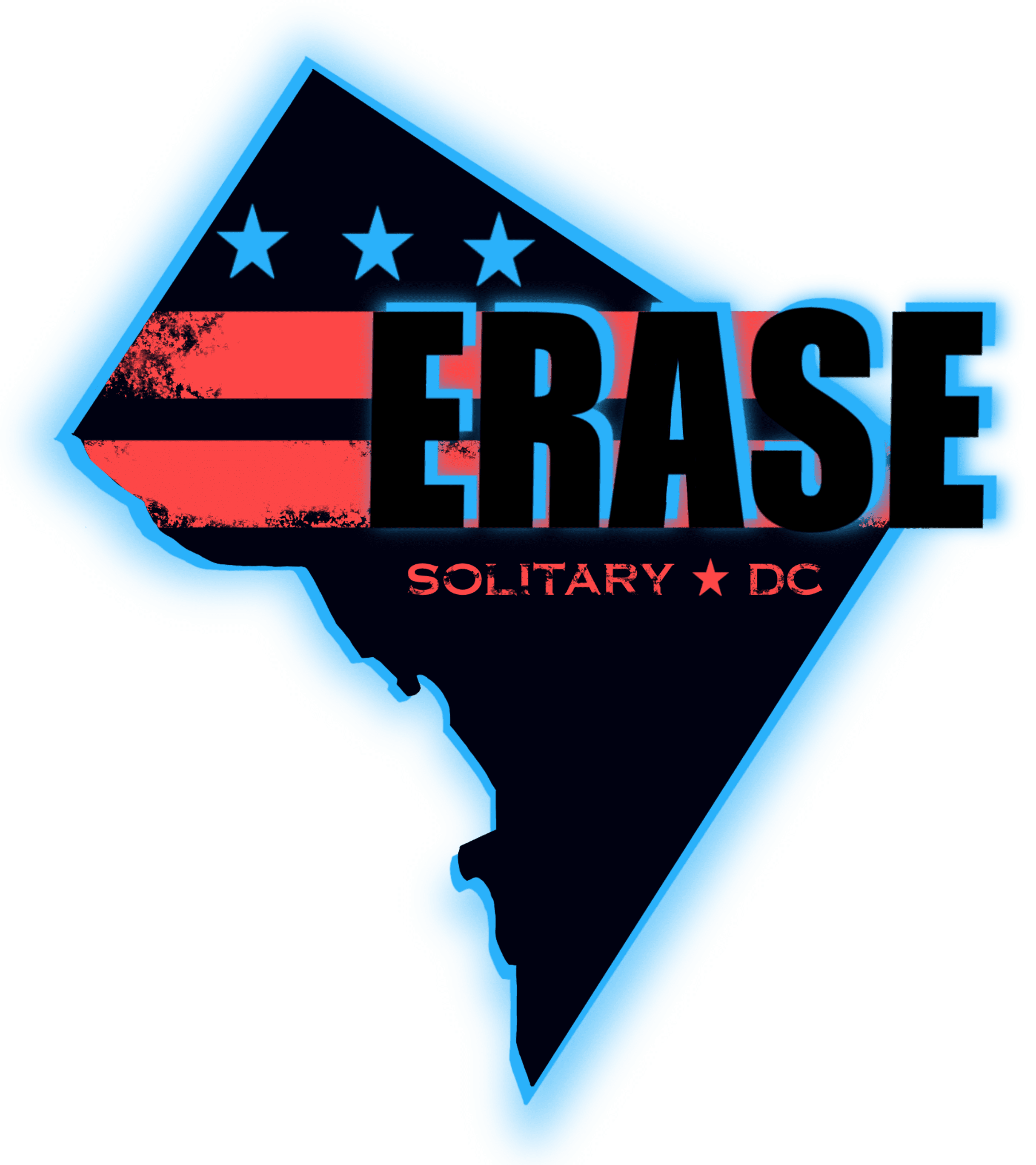Directly impacted individuals' experience with solitary confinement
#unlocktheboxdc
In the spring of 2023, a formal group within the Unlock-the-Box Coalition convened in DC. This group consists of individuals who have experienced incarceration, have family members directly impacted by it, or have been affected by solitary confinement. In August 2023, some people from this group sat down and recorded their perspectives for the community on why they think the ERASE Bill should be enacted. Here are some highlights from this 35-minute recorded discussion on how solitary confinement impacted them, why the practice does not increase safety, and underscored the importance of the ERASE Bill ending this practice in DC.
Herbert
Herbert Robinson is an outreach team member for More than Our Crimes, and he is a co-facilitator of the Unlock-the-Box DC coalition. Herbert was released from prison in 2022 after serving 20 years in D.C. shelter homes, jail, and federal prisons.
The whole facility can experience solitary confinement if it is on lockdown.
When I went to DC jail in 2003, the entire facility was 22 hours in the cell and two hours out. This was the general population, and they said this was because of security measures. The institution used this as their excuse. How is this a security measure when you are fully staffed to run the whole jail?
Solitary confinement did not make me feel safer.
When you went to whatever form of solitary confinement that was operating, the hole, the Special Housing Unit (SHU), the Special Handling Unit, whichever name you call it, you only showered every two or three days. You didn’t get recreation, but every two or three days. You have to get handcuffed to leave your cell to go to the shower. And now you’re walking to the shower down a tier, and people can assault you through the bars, throwing their feces and any other item they wish. The worst part about it was not being able to defend yourself.
Solitary confinement worsened mental health issues in the jail.
If you have a mental health issue, you are housed in solitary confinement. They are not getting the help needed for their troubles. These mental issues impact everyone in the unit: At two or three in the morning, these individuals are banging on the door and yelling because their medication wore off or now they’re hungry. Imagine that I’m two cells down or the cell right next to them. And they are banging on the wall. That’s when it becomes torture for real.
Gene
Gene S. Downing is the co-lead of the Council for Court Excellence Second Chances Hiring Alliance, has served as the Congressman John Lewis Fellow at Free Minds Book Club and Writing workshop, and is Co-Chair of “Thrive Under 25” Coalition. He served 21 years in prison and jail.
People are different after experiencing solitary confinement.
I have been to the SHU several times. Sometimes, for short stays, sometimes for longer stays, you are 100 percent segregated, not just from the outside world, but from human contact. You do not get to contact other people. You do not even get your mail. Mail can become a danger to you. Some people do not realize the psychological trauma that plays not only on you but also on your family. I’ve seen guys who have gone to the SHU and come out much differenly when they went in.
There are too many reasons why institutions can use solitary confinement without accountability.
My daughter couldn’t understand why I was placed in the SHU. She asked why would they do that? I explained to her all the different variations of why they would put you in the SHU. She really could not wrap her mind around the reason why, and to this day, neither can I. They will put you in the SHU for your safety. There are a lot of mental health issues in the jail, and the answer to that is to lock a person in a cell. If someone’s getting a little out of control, they will restrain them. If they put you on suicide watch, they will lock you in a cell, strip you of everything you have, and just have somebody sit outside your door and watch you. It could be a person [getting a disciplinary record], the system says, “oh, well you are becoming a problem, so you’re going to be on lockdown.”
Devin
Devin D. Smith is the founder and CEO of Ship and Anchor LLC. Upon returning from prison and completing his degree from North Carolina State University, Devin moved to Washington, D.C., where he works as a business development consultant.
Solitary confinement is the most severe form of punishment.
I have been in prison, but I personally have not been in solitary confinement. But on my first day in prison, weed had been found in a cell. I guess they were trying to figure out who it was. They told me, basically, give us a name, or you’ll go into solitary. I said, look, you can check my records. I just got in here today. That was my first experience seeing how solitary confinement is used. It’s used as punishment. Understand that this is a severe form of punishment.
Ending solitary is about holding prisons and people in them accountable.
In order to truly hold someone accountable for their actions, we have to heal the harm done to the community. The most dangerous person, whether they are in prison or anywhere else, is a person who has nothing to look forward to or live for. That is also one of the harms of solitary confinement – giving people nothing to look forward to or to live for. One of the reasons why I think things like the ERASE Bill is needed is this keeps the system accountable. The Department of Corrections must report certain activities and it makes it more transparent so that they can be held a little bit more accountable to why solitary confinement is being used.
Charnal
Charnal Chaney is the Chief Executive Officer (CEO) and Founder at Bold Yoga LLC. She is from and lives in Washington, D.C. She is the child of an incarcerated mother and saw the intergenerational impact of solitary confinement.
Solitary confinement impacts how people show up in relationships.
When I learned my mother experienced solitary confinement, I started to do research around what a person would be like after they did that for an extended amount of time. I learned her first five years in prison was really rough for her. I learned solitary confinement impacts the brain and how it affects their relationships. Solitary confinement made it really difficult for us to really repair our relationship.
Solitary confinement impacts families.
I was three years old when my mother started her 18-year sentence. When she was released, we tried to start the family reunification process, we started to try to heal the relationship and the way she would show up is the way she had conditioned herself for 18 years. I was still that three-year-old little girl when she came home who needed her mother. But there wasn’t a full sense of awareness, like ‘you are now grown, I still want to be a mother,’ but unsure of how to be that person.
Solitary confinement has an intergenerational impact.
One of the things that I realized, because my mother did not have the capacity to show up for me, solitary confinement created a disconnect with me and my kids. It was hard for me to want to show up as a mother for them. That is why I decided to take my healing journey so seriously: because I knew I needed to break that generational impact or trauma. We need to understand that this generational impact is not just the physical separation from people, but the emotional and spiritual separation from people. I really do feel like solitary confinement should be banned.

The Unlock the Box DC Coalition is a group of survivors of solitary confinement and other transformative justice advocates working to end the use of solitary confinement in all its forms in the District of Columbia. The DC Coalition is part of the Unlock the Box national campaign to end solitary confinement in the United States. The national campaign includes partners from 19 states and D.C. working to transform incarceration and end the use of solitary confinement nationwide.
